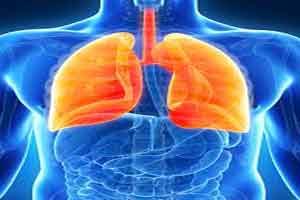- Home
- Editorial
- News
- Practice Guidelines
- Anesthesiology Guidelines
- Cancer Guidelines
- Cardiac Sciences Guidelines
- Critical Care Guidelines
- Dentistry Guidelines
- Dermatology Guidelines
- Diabetes and Endo Guidelines
- Diagnostics Guidelines
- ENT Guidelines
- Featured Practice Guidelines
- Gastroenterology Guidelines
- Geriatrics Guidelines
- Medicine Guidelines
- Nephrology Guidelines
- Neurosciences Guidelines
- Obs and Gynae Guidelines
- Ophthalmology Guidelines
- Orthopaedics Guidelines
- Paediatrics Guidelines
- Psychiatry Guidelines
- Pulmonology Guidelines
- Radiology Guidelines
- Surgery Guidelines
- Urology Guidelines
Scientists propose treatment for severe lung diseases

Cincinnati : Researchers are developing a new drug to treat life-threatening lung damage and breathing problems in people with severe infections like pneumonia, those undergoing certain cancer treatments and premature infants with underdeveloped, injury prone lungs.
Scientists at Cincinnati Children's Hospital Medical Center report April 19, 2016 in Science Signaling that a transcription factor called FOXF1 activates several biological processes that promote recovery from acute lung injury. Two laboratories at Cincinnati Children's are developing a pharmacologic compound that in mouse models stimulates FOXF1 and promotes repair after lung injury.
"Besides toxic insults from some cancer treatments, acute lung injury can be a major medical problem for people who get infectious diseases like flu, pneumonia or Ebola because of pathogens that target the lung," said Vladimir Kalinichenko, MD, PhD, co-senior author and a physician and researcher in the Divisions of Pulmonary Biology and Developmental Biology at Cincinnati Children's. "A small molecule compound we developed efficiently stabilizes the FOXF1 protein in cell cultures and mouse lungs, and it shows promise in inhibiting lung inflammation and protecting experimental mice from lung injury."
Along with co-senior author Tanya Kalin, MD, PhD, in the Cincinnati Children's Perinatal Institute, the research team learned that loss of FOXF1 in lung endothelial cells of mice caused them to die from respiratory problems, pulmonary edema (fluid in the lungs) and lung inflammation. This happens when endothelial cells that line blood vessels in the lung can no longer provide a protective barrier between the external environment and the body's circulatory system.
Mutations in FOXF1 gene cause alveolar capillary dysplasia, a rare and universally fatal congenital lung disorder of newborns and infants that researchers said underscores the importance of the FOXF1 in the respiratory system. Alveolar are tiny air sacs in the lung.
The authors propose that stabilizing or restoring FOXF1 will promote the formation of blood vessels in lungs, promote healing and decrease breathing complications in children and adults.
Researchers are following up their current study with further development of the targeted small molecule they recently discovered. Specifically, they are determining efficacy and safety of the FOXF1-targeting compound in mouse models of lung injury and repair. The authors emphasize that additional time and research are needed before the compound can be tested in human patients.
Acute respiratory distress syndrome is a life-threatening complication of acute lung injury with a mortality rate of more than 35 percent. It accounts for about 75,000 deaths and 3.5 million hospital days per year in the United States, according to the authors. Given the lack of major improvements in the clinical management of acute lung injury and respiratory distress, the current study is designed to address a compelling need for innovative molecular approaches that complement existing therapies, according to the researchers.
Funding support came in part from the National Institutes of Health (HL84151, HL123490, CA142724) and the Cincinnati Children's Perinatal Institute.

Disclaimer: This site is primarily intended for healthcare professionals. Any content/information on this website does not replace the advice of medical and/or health professionals and should not be construed as medical/diagnostic advice/endorsement or prescription. Use of this site is subject to our terms of use, privacy policy, advertisement policy. © 2020 Minerva Medical Treatment Pvt Ltd